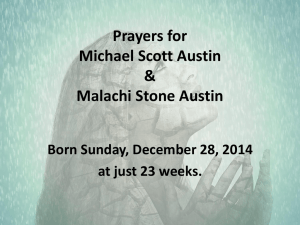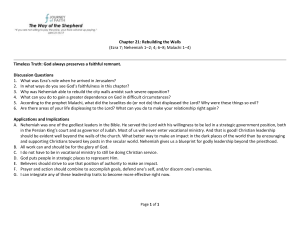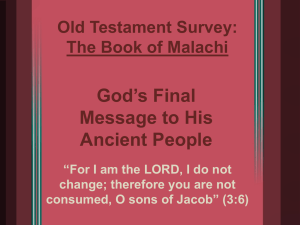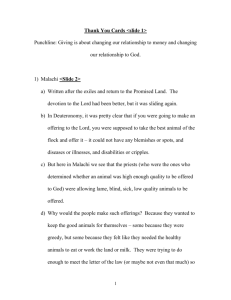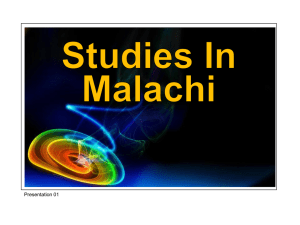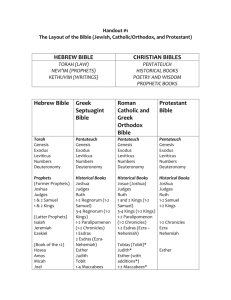Criswell Theological Review 2.1 (1987) 19
advertisement
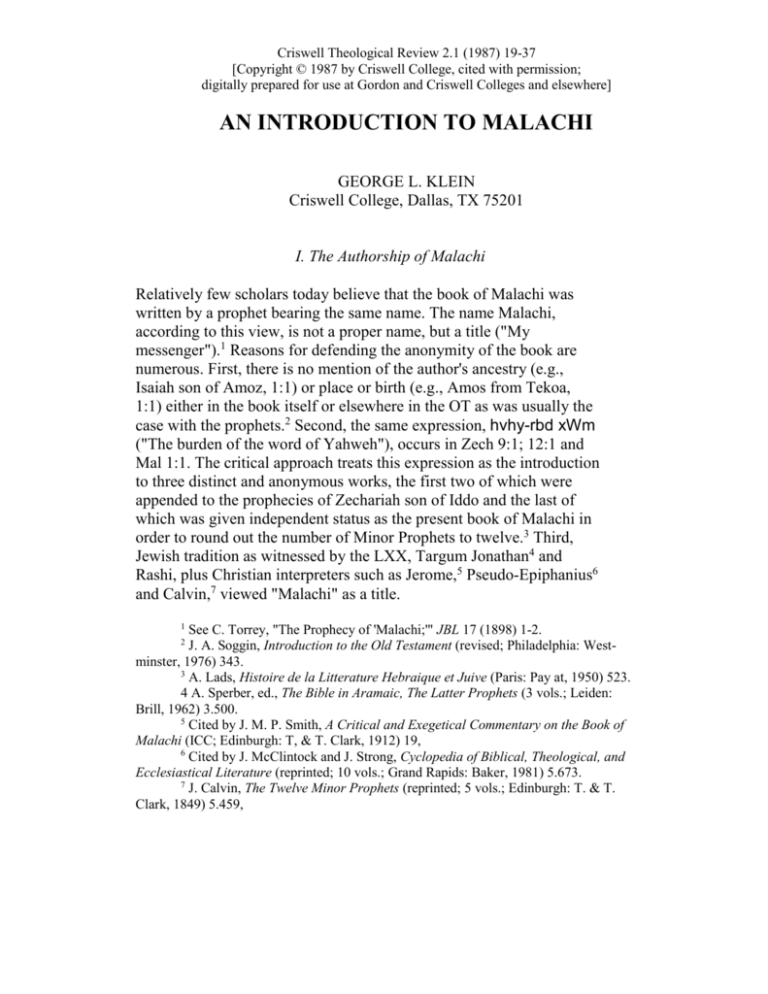
Criswell Theological Review 2.1 (1987) 19-37 [Copyright © 1987 by Criswell College, cited with permission; digitally prepared for use at Gordon and Criswell Colleges and elsewhere] AN INTRODUCTION TO MALACHI GEORGE L. KLEIN Criswell College, Dallas, TX 75201 I. The Authorship of Malachi Relatively few scholars today believe that the book of Malachi was written by a prophet bearing the same name. The name Malachi, according to this view, is not a proper name, but a title ("My messenger").1 Reasons for defending the anonymity of the book are numerous. First, there is no mention of the author's ancestry (e.g., Isaiah son of Amoz, 1:1) or place or birth (e.g., Amos from Tekoa, 1:1) either in the book itself or elsewhere in the OT as was usually the case with the prophets.2 Second, the same expression, hvhy-rbd xWm ("The burden of the word of Yahweh"), occurs in Zech 9:1; 12:1 and Mal 1:1. The critical approach treats this expression as the introduction to three distinct and anonymous works, the first two of which were appended to the prophecies of Zechariah son of Iddo and the last of which was given independent status as the present book of Malachi in order to round out the number of Minor Prophets to twelve.3 Third, Jewish tradition as witnessed by the LXX, Targum Jonathan4 and Rashi, plus Christian interpreters such as Jerome,5 Pseudo-Epiphanius6 and Calvin,7 viewed "Malachi" as a title. 1 See C. Torrey, "The Prophecy of 'Malachi;'" JBL 17 (1898) 1-2. J. A. Soggin, Introduction to the Old Testament (revised; Philadelphia: Westminster, 1976) 343. 3 A. Lads, Histoire de la Litterature Hebraique et Juive (Paris: Pay at, 1950) 523. 4 A. Sperber, ed., The Bible in Aramaic, The Latter Prophets (3 vols.; Leiden: Brill, 1962) 3.500. 5 Cited by J. M. P. Smith, A Critical and Exegetical Commentary on the Book of Malachi (ICC; Edinburgh: T, & T. Clark, 1912) 19, 6 Cited by J. McClintock and J. Strong, Cyclopedia of Biblical, Theological, and Ecclesiastical Literature (reprinted; 10 vols.; Grand Rapids: Baker, 1981) 5.673. 7 J. Calvin, The Twelve Minor Prophets (reprinted; 5 vols.; Edinburgh: T. & T. Clark, 1849) 5.459, 2 20 CRISWELL THEOLOGICAL REVIEW What then was the origin of the title for those who believe that the book was anonymous? Nowack is representative of the standard reply which maintains that the title was taken from the mention of ykxlm ("My messenger") in 3:1.8 In other words, the mention of ykxlm in 3: 1 was misunderstood as a reference to the name of the prophet who penned the book. However, Childs wisely observes, "Such an identification wreaks havoc with the entire message of the book."9 The ykxlm of 1:1 and 3:1 cannot be the same person, for 1:1 must refer to the prophet through whom the oracle came whereas 3:1 speaks of the one in whom rested the responsibility of paving the way for the future prophetic hope, the Messiah.10 As Childs notes, one cannot argue that an editor misunderstood the prophetic hope of a Messiah which is conveyed clearly in 3:1 as well as elsewhere.11 The first objection to identifying the author of Malachi with the prophet bearing the same name is relatively minor. Granted, the lineage of the prophet and his birthplace are regularly given in the canonical prophets, but exceptions are known. For instance, Obadiah's lineage and Habakkuk's place of birth are unknown, with both of these books mentioning the name of the prophet only in the superscription. The next two points, however, are the main points upon which the theory of anonymity rests. The anonymity of Malachi, while not a problem of liberalism as 12 such, is tied integrally to the liberal view that Zech 9-11, 12-14, and Malachi were originally three independent and anonymous works.13 The view is bolstered by the thrice-repeated phrase hvhy-rbd xWm ("the burden of the word of Yahweh," Zech 9:1; 12:1; and Mal 1:1) which is generally interpreted to mean that these three oracles were once part of the same collection and were placed later in their present location in the canon arbitrarily. This widely-held conclusion has been challenged by Childs using various lines of argumentation. Childs first argues that the form of the word xWm ("burden, oracle") is grammatically absolute (ie., syntactically independent)14 8 D. W. Nowack, Die kleinen Propheten (Gottingen: Vandenhoeck & Ruprecht, 1897) 390. 9 B. S. Childs, Introduction to the Old Testament as Scripture (Philadelphia: Fortress, 1979) 493. 10 For similar expressions see Isa 40:3; 57:14; and 62:10. 11 Childs, Introduction, 493. 12 See W. S. LaSor, D. A. Hubbard and F. W. Bush, Old Testament Survey (Grand Rapids: Eerdmans, 1982) 501-2; and R. K. Harrison, Introduction to the Old Testament (Grand Rapids: Eerdmans, 1969) 958. 13 O. Eissfeldt, The Old Testament: An Introduction (New York: Harper & Row, 1965) 441. 14 The word xWm is a technical term often used to introduce a prophet's message (cf. Isa 13:1; Nah 1:1 et al.). Klein: AN INTRODUCTION TO MALACHI 21 in Mal 1:1, thus decreasing the similarity between the three occurrences of the term.15 Unfortunately for Childs' thesis, the form of xWm is absolute in all three of the passages under consideration.16 Childs continues by maintaining that Zech 9:1 is not a superscription while 12:1 is. He further believes that Mal 1:1 is also a superscription sharing many points in common with other such superscriptions in the OT.17 Childs concludes by noting that Zech 9:1 and 12:1 are verbal constructions whereas Mal 1:1 is not, a minor point actually, but calculated to distance Malachi from the latter portions of Zechariah.18 In conclusion, Childs writes, "the problem of authorship of the book of Malachi is an independent question which cannot be decided from an alleged similarity to anonymous [sic] passages in Zechariah."19 While I agree with Childs' observation, his arguments are less than convincing. Ultimately, the decision rests upon how one views Zechariah. Critical scholars have divided Zechariah into two or three parts with one division occurring at 9:1 and the other, if advocated, at 12:1.20 Reasons for postulating a multiple authorship of Zechariah center upon mention of events centuries later than the 6th century B.C. date of Zechariah son of Iddo (cf. 9:1ff) and alleged differences of vocabulary and literary style. Since stylistic arguments are notoriously subjective, the consensus is that the "prophecies" and how they are understood determine the outcome of the authorship and unity questions for Zechariah. At the risk of sounding simplistic, the presuppositions the interpreter has regarding predictive prophecy will largely determine the conclusion one reaches.21 If one ascribes all 14 chapters of Zechariah to the son of Iddo then any affinity to Malachi is tenuous indeed. We have discussed thus far the first half of the superscription, but the second half "through Malachi" must now be examined. The English title "Malachi" is a transliteration of the Hebrew word ykixAl;ma. The basic word j`xAl;ma can refer either to a human emissary (Gen 32:3) or to an angel (Gen 28:12). In Malachi a human messenger is clearly in mind. 15 Childs, Introduction, 491. KJV, RSV, NASB and NIV all fail to render this phrase consistently as "An oracle: the word of the LORD. . . .“ 17 Childs, Introduction, 491-92. 18 Ibid., 492. 19 Ibid., 492. 20 Eissfeldt, Introduction, 434-40. 21 See G. L. Archer, Jr., A Survey of Old Testament Introduction (revised; Chicago: Moody, 1974) 433-38; and Harrison, Introduction, 950-57. 16 22 CRISWELL THEOLOGICAL REVIEW The suffix (-i) has engendered a fair amount of discussion. Keil's view is that the suffix is an old genitive ending called a hireq compaginis,22 but this conclusion is utterly untenable.23 Another view is that the suffix is a hypocoristicon (or abbreviation) for the divine name Yah, the shortened form of Yahweh, which would be translated "Messenger of Yah." While some like Soggin maintain that a theophoric element in the name is "extremely dubious,"24 there is good biblical precedent. For instance, one finds ybx (Abi, 2 Kgs 18:2) and hybx (Abiyyah, 2 Chron 29:1) as well as yrx (Uri, 1 Kgs 4:19) and hyrvx (Uriyah, 1 Chron 11:41). The hypocoristic meaning of the name Malachi, while not the simplest understanding, is a distinct possibility. The consensus of opinion, however, is that the suffix is the simple first person singular pronominal suffix "my."25 This brings us to the final and perhaps most important reason for treating Malachi as an anonymous work, namely the early Jewish and Christian tradition to that effect, of which the LXX is the most notable. The LXX renders Mal 1:1 with e]n xeiri> a]gge<lou au]tou? ("by the hand of His messenger"). Immediately two questions are raised. First, why did the LXX use the third person masculine singular pronoun when the MT attests a first person ("my") reading? Second, was the Septuagintal understanding of the word as an appellative correct? The first problem can be easily explained by hypothesizing that the final yod of Malachi representing "my" was misread as a ' waw signifying "his."26 The second question is harder to explain, but: apparently the confusion was due to the general lack of biographical: information on Malachi. To be sure, the LXX does understand ykxlm as an appellative in v 1, but Pusey does note that the LXX did append the name MALAXIAS ("Malachi") as a title, seemingly witnessing to a completely different understanding, that of a proper noun.27 In other words, the testimony of the LXX is not as decisive in favor of anonymity as some think. Targum Jonathan's attempt to identify the author of Malachi as Ezra the scribe as well as the numerous 22 C. F. Keil, The Twelve Minor Prophets (2 vols.; 1868, reprinted; Grand Rapids: Eerdmans, 1949) 2.425. 23 For a general discussion, see GKC §90k-n. 24 Soggin, Introduction, 343. 25 See J. G. Baldwin, Haggai, Zechariah, Malachi (Downers Grove, IL: InterVarsity, 1972) 211. 26 This is a common textual corruption in which the "short tail" of the yod is misread for the "longer tailed (but otherwise identical)" waw. For example, see Isa 5:29. 27 E. B. Pusey, The Minor Prophets: A Commentary (reprinted; 2 vols.; Grand Rapids: Baker, 1950) 2.461. Klein: AN INTRODUCTION TO MALACHI 23 other identifications by other sources all seemingly stem from the dearth of knowledge about the prophet. Furthermore, as has been noted earlier in this study, the belief that Malachi was a proper name could not have originated from a misunderstanding of the referent in 3:1. Finally, then, since the canonical prophets were otherwise not anonymous and the arguments for anonymity can be answered, it is preferable to treat the book as the only known work of the prophet Malachi. II. The Date of Malachi Malachi contains no precise information regarding the time of the book's writing. Thus one is forced to look to internal evidence in the text itself. Because Malachi mentions current abuses at the temple (1:7ff; 2:13; 3:10), the terminus a quo of the prophecy must be 516/515 B.C., the year the second temple was completed. Since temple worship has been restored, Malachi must follow both Haggai and Zechariah. More precise dating can be accomplished by noting the similarity of themes in Malachi to those in Nehemiah, the silence in Nehemiah regarding Malachi, the interpretation of the term hHp ("governor ," 1:8) and the occasion of the conquest of the Edomites. The similarity between concerns of Malachi and those of Nehemiah have long been noticed. W. Kaiser summarizes well the basic points: 1. Marriage of heathen wives (Mal 2:11-15 and Neh 13:23-27) 2. Neglect in paying the tithes (Mal 3:8-10 and Neh 13:10-14) 3. Disregard of the Sabbath (Mal 2:8-9; 4:4 and Neh 13:15-22) 4. Corruption of the priesthood (Mal1:6-2:9-and Neh 13:7-9) 5. Existence of social wrongs (Mal 3:5 and Neh 5:1-13)28 Since it was during Nehemiah's second period of ministry in Israel in which he addressed these issues, many scholars would date Malachi to this period also.29 E. Sellin and G. Fohrer would, however, date the prophecy before both Ezra and Nehemiah, around 465 B.C. since Ezra and Nehemiah put a stop to the practices outlined in Malachi.30 This view fails to recognize the rapidity with which Israel could relapse into sin as well as overestimating the effect of the EzraNehemiah reforms. 28 W, C. Kaiser, Jr., Malachi: God's Unchanging Grace (Grand Rapids: Baker, 1984) 16. 29 Archer, Survey, 440. E. Sellin and G. Fohrer, Introduction to the Old Testament (Nashville: Abingdon, 1968) 470. 30 24 CRISWELL THEOLOGICAL REVIEW A surprisingly early dating of the book is found in the work of B. Dahlberg who properly notes dissimilarities between Nehemiah and Malachi such as: the absence of divorce from the books of EzraNehemiah; the failure to find Nehemiah's concern for Sabbath abuses addressed to the same degree in Malachi; the far more elaborate treatment of tithes and offerings in Nehemiah as well as the distinction which appears to be made between priests and Levites (10:10, 13, 30) which he argues is not found in Malachi.31 Dahlberg argues further that the vocabulary, style and perspective of Malachi is so close to that of Deuteronomy, which he dates to the days of the Josianic Reform (621 B.C.), that "Malachi's date is at the latest exilic."32 Dahlberg's observations concerning differences between Nehemiah and Malachi are valid, yet one need not date Malachi in such an extreme fashion. Indeed, no perceived difference is so great that one should reinterpret the date. Furthermore, the likeness which Malachi bears to Deuteronomy is also correct, but one should not date Deuteronomy to the Josianic era for reasons which surpass the scope of this paper. Next, since Nehemiah does not mention Malachi by name and since the closeness of the two is great as we have just seen, two primary views have appeared. One approach is to date Malachi after Ezra and before Nehemiah around 460 B.C. Others see the silence in Nehemiah concerning Malachi as indicative of Malachi's ministry falling within the two great periods of Nehemiah's activity in Israel (444 and ca. 435 B.C.). R. Dentan, however, argues in the opposite direction, feeling that Malachi would have had great sympathy for Nehemiah and would surely have mentioned him by name. Dentan wishes to date the book around 450 B.C.33 The third point is the use of the word hHp for governor in 1:8. This word may well be of Persian origin leading some to render the term "satrap." W. Neil is representative of the position that hHP in 1:8 clearly points to a Persian governor and not to Nehemiah.34 Dogmatism is unwarranted as H. Wolf notes. Even though xtwrt (tirsata', Neh 10:1) was the expression usually applied to Nehemiah, he does call himself a hHp in 5:14.35 If Nehemiah was the governor of 1:8, 31 B. T. Dahlberg, Studies in the Book of Malachi (Ph.D. dissertation, University of Columbia, 1963) 175-77. 32 Ibid., 191. 33 R. Dentan, "Malachi," Interpreter's Bible (12 vols.; New York: Abingdon, 1956) 6.1118. 34 W. Neil, "Malachi," Interpreter's Dictionary of the Bible (5 vols.; Nashville: Abingdon, 1962) 3.229. 35 H. Wolf, Haggai and Malachi (Chicago: Moody, 1976) 58. Klein: AN INTRODUCTION TO MALACHI 25 Kaiser suggests that Malachi would likely have mentioned him as Haggai named Zerubbabel. If one does grant Kaiser's argument from silence, one could only say that Malachi was either before Nehemiah's first reform, before his second reform or after his second reform.36 Fourthly, 1:2ff mentions a recent calamity which has befallen Edom. While the downfall of Edom was a widely-known fact, the precise dating of this event has never been determined satisfactorily. Thus, the event is useless for fixing the date of Malachi.37 A further line of evidence followed by non-conservatives is to posit that Malachi agrees with Deuteronomy against the Priestly Code in making no distinction between priests and Levites (2:4ff). Malachi is understood to follow Deuteronomy which is dated in the 7th century B.C. Malachi is in this regard different from the Priestly Code which does make this distinction and follows Malachi chronologically.38 The date of Malachi would then be 460-450 B.C. Rowley, on the other hand, argues that similarities in tithing laws might well indicate that Malachi was later than the P source.39 Torrey argues even more extremely that Malachi is to be dated in the first half of the 4th century B.C.!40 If one accepts the biblical presentation of Israel's religious development in contradistinction to the Wellhausian reconstruction, then the material pertaining to priests and Levites in Malachi has no bearing upon the date of the prophecy. In the final analysis, a precise date for the prophecy cannot be fixed. One must, it seems, place the date in the time of Nehemiah; as J. M. P. Smith observes, "the Book of Malachi fits the situation amid which Nehemiah worked as snugly as a bone fits its socket."41 The early date of 460-450 B.C. is plausible, but R. Pfeiffer's conviction that it is "positive" is certainly overstated.42 On the other hand, several convincing arguments can be presented to favor the 435-433 B.C. date. For one, Ezra reestablished the knowledge and authority of God's law (Ezra 7:14, 25ff).43 More importantly, if the abuses outlined in Malachi had occurred at the 36 Kaiser, Malachi, 16-17. Dentan, "Malachi," 1118. 38 Neil, "Malachi," 229; K. Elliger, Vas Buch der zwolf Kleinen Propheten (Gottingen: Vandenhoeck & Ruprecht, 1951) 178. 39 H. H. Rowley, The Growth of the Old Testament (London: Hutchinson, 1950) 123. 40 Torrey, "Malachi," 14. 41 J. M. P. Smith, Malachi, 7. 42 R. H. Pfeiffer, Introduction to the Old Testament (New York: Harper & Row, 1941) 614. 43 Kaiser, Malachi, 15. 37 26 CRISWELL THEOLOGICAL REVIEW time of Ezra's or Nehemiah's first reform, they would have been mentioned in the respective texts. Since hHp could have referred to Nehemiah himself, Keil writes: If, therefore, Malachi condemns and threatens with the punishment of God the very same abuses which Nehemiah found in Jerusalem on his second arrival there, and strove most energetically to exterminate, Malachi must have prophesied at that time; but whether immediately before Nehemiah's second arrival in Jerusalem, or during his presence there. . . cannot be decided with certainty.44 Thus, the date of ca. 435 B.C., immediately before or at the onset of Nehemiah's second work in Israel is the preferred date. III. The Unity of Malachi Malachi does not present the interpreter with questions of unity as grave as elsewhere in the OT, but some questions have been raised. D. Sellin is representative of those who believe that the book has editorial additions, mentioning 2:11ff and 4:5ff (= MT 3:23ff).45 Torrey adds that 4:4ff (= MT 3:22ff) is an appendix to the book having "no natural connection with the preceding,"46 as the conservative writer J. Baldwin allows also.47 Rowley believes that these verses serve as an editorial conclusion to the entire Book of the Twelve.48 A different analysis of the book has been produced by Y. Radday and M. Pollatschek who apply computerized statistical analyses of the vocabulary of Malachi as well as the other post-Exilic works. This study concludes that all of chap. 3 was from the pen of a different, writer from chaps. 1-2!49 This endeavor has utilized a highly dubious methodology to produce a conclusion of little or no value. For a defense of the unity of the book one need not turn to theological conservatives, for many non-conservatives ably accomplish the task. O. Kaiser has no problems with the book from his 44 Keil, Malachi, 427. D. E. Sellin, Vas Zwolfprophetenbuch (Zweite Halfte; Leipzig: A. Deichertsche Ver. D. Werner Scholl, 1930) 587. Note the somewhat larger and more surgical list (1:11-13, 14; 2:2, 7, 11b-13a, 15ab, 16b; 3:1b, 3ff; 4:4ff [= MT 3:22ff]) of K, Elliger, Kleinen Propheten, 178. Elliger's views have not been adopted, and at present only 4:4ff (= MT 3:22ff) is discussed as a possible addition. 46 Torrey, "Malachi," 7; see Lods, Histoire, 525. 47 Baldwin, Malachi, 214. 48 Rowley, Growth, 124; see Dentan, "Malachi," 1117. 49 Y. T. Radday and M. A. Pollatschek, "Vocabulary Richness in Post-Exilic Prophetic Books," ZAW 92 (1980) 345. 45 Klein: AN INTRODUCTION TO MALACHI 27 literary-critical perspective, but does wish to transpose 3:6-12 and 2:10-16 to after 1:2-5.50 Soggin states outright that "the text does not present any difficulties,"51 while R. Rendtorff pleads that 4:4ff (= MT 3:22ff) must be treated as an integral part of the last disputation 3:134:3 (= MT 3:6-21).52 A significant work by A. van Selms not only attempts to validate the unity of the entire work, but maintains that 4:5ff (= MT 3:23ff) is "an integral part, if not the key-verse of the whole book."53 Moreover, a recent study has endeavored to demonstrate not only the unity of Malachi, but further that Haggai, Zechariah and Malachi should be understood as a literary and thematic unity.54 IV. The Style of Malachi Discussion has focused on how best to describe the method Malachi uses to communicate with Israel. "Sermons" have been proffered,55 while "catechisms" were suggested to capture the questioning approach used in Malachi, a technique found also in Haggai.56 The most common term is that of "disputation."57 Despite Boecker's preference for the term "discussion,"58 "disputation" best captures the confrontational tone of the book.59 The disputes Malachi brings against Israel are legal in nature having a courtroom setting, with covenantal law serving as the basis for the charges against the people.60 This confrontational style underscores the people's deep hostility toward both Yahweh and the prophet whom He had appointed. The people were argumentative, challenging the prophet's 50 O. Kaiser, Introduction to the Old Testament (Minneapolis: Augsburg, 1975) 284. Soggin, Introduction, 346. 52 R. Rendtorff, The Old Testament: An Introduction (Philadelphia: Fortress, 1986) 242; Eissfeldt, Introduction, 442 accepts the relationship between 4:4ff (= MT 3:22ff) and the disputation within which it falls, but still argues that the last verses are an addition. 53 A. van Selms, "The Inner Cohesion of the Book of Malachi," OTWSA 13-14 (1970-71) 38. 54 R. W. Pierce, "Literary Connectors and a Haggai/Zechariah/ Malachi Corpus," JETS 27 (1984) 277-89; "A Thematic Development of the Haggai/Zechariah/Malachi Corpus," JETS 27 (1984) 401-11. 55 Ibid., 285. 56 R. Braun, "Malachi-A Catechism for Times of Disappointment," CurTM 4 (1977) 299. 57 Sellin, Zwolfprophetenbuch, 2.588. 58 H. J. Boecker, "Bemerkungen zur formgeschtlichen Terminologie des Buches Maleachi," ZAW 78 (1966) 79. 59 R. Smith, Micah-Malachi (Waco: Word, 1984) 300. I 60 E. Achtemeier, Nahum-Malachi (Atlanta: John Knox, 1986) 172. 51 28 CRISWELL THEOLOGICAL REVIEW mandate to speak for Yahweh.61 Whether Israel's replies in Malachi were spoken by the people themselves or were a rhetorical device used by the prophet is inconsequential; the retorts accurately reflected the people's attitudes. The structure of Malachi is commonly organized in a six-part fashion based upon Malachi's interrogations as follows: 1:1 (superscription) 1:2-5 1:6- 2:9 2:10-16 2:17-3:5 3:6-12 3:13-4:6 (= MT 3:24)62 For a critique of this method of organizing Malachi's message, see the compelling work of my colleague E. R. Clendenen.63 Clendenen sees the book in three chiastic movements, articulated from a linguistic perspective.64 Another question regarding Malachi's style is whether or not the book is poetry. The modern translations each arrange the text as though it was prose, but the editors of both BHK and BHS place the Hebrew text in a poetic configuration. The difference of opinion is reflected also in the commentators. Sellin65 maintains that Malachi has a poetic rhythm to it while W. Kaiser flatly states that the book is prose.66 J. M. P. Smith goes as far as to say that, "If Malachi is to be regarded as poetical, either in form or content, distinctions between poetry and prose must be abandoned."67 Both extremes should be abandoned, however. The prose-poetry distinction should properly be viewed as a continuum. One might find high style poetry in a passage, prosy poetry or poetic prose, and so forth. This mediating position best represents the situation in Malachi. Some passages appear prosaic (1:10ff), whereas others seem quite poetic, complete with parallelism 61 Neil, "Malachi," 231; LaSor, Survey, 503. J. A. Fischer, "Notes on the Literary Form and Message of Malachi," CBQ 34 (1972) 316. 63 E. R. Clendenen, "The Structure of Malachi: A Textlinguistic Study," CTR 2 (1987). 64 This chiastic arrangement of the three movements in Malachi argues for the original inclusion of 4:4-6 (= MT 3:22-24) since the chiasm would be destroyed otherwise. 65 Sellin, Zwolfprophetenbuch, 2.587. 66 W. Kaiser, Malachi, 18. 67 J. M. P. Smith, Malachi, 5. 62 Klein: AN INTRODUCTION TO MALACHI 29 and meter (1:6ff). Other passages lie somewhere in between (2:6ff). Whether one sees the book as "'lofty prose" as does Wolf68 or as poetry which is "often prosaic" with Torrey69 is inconsequential as long as one does recognize a substantial quantity of poetic characteristics in the book.70 V. The Purpose of Malachi Israel's circumstances in Malachi's day had changed. For the first time in centuries the land saw a degree of political autonomy from the Persians plus a new but developing money economy.71 Spiritually, though, the outlook was utterly bleak. Israel's contact with the world around her had contributed to a new and secular outlook on life. The old beliefs and practices had become passe, and were in need of reinterpretation according to the majority. Yahweh, the God who had been so active in Israel's history long ago, was seen as transcendent and uninvolved in the lives of men (2:17; 3:13ff). The effect of such notions was clearly seen in the public worship at the Temple. The perfunctory manner in which the priests conducted their duties was the most obvious consequence of the new mentality (1:6-2:9). The people evidenced an acceptance of pagan cults (2:10ff). The faithful few withdrew from their culture in discouragement, producing little influence upon their contemporaries (3:16ff).72 Another change, a change in the people's future expectations, profoundly influenced the way people thought and acted in Malachi's time. The eschatological prophecies in Isaiah 40-66 (and elsewhere) led most Israelites to believe that the post-exilic period would mark the beginning of the messianic age. The glories of the Davidic era were soon to be recovered they thought (cf. Jer 23:5ff). They expected the land to become fertile as never before (Isa 41:18ff). The Israelites also believed that all nations would begin to serve them in the postexilic era (Isa 49:22ff). The realities which the former exiles faced were brutal, anything but what they had anticipated. Only a small group of the exiles returned, and those who did found life as hard, if not harder than ever. The land reclaimed by the returnees was proportionately quite small in comparison to what they had possessed before the exile. Finally, the land was rocky and infertile, not at all 68 Wolf, Malachi, 59. Torrey, "Malachi," 14. 70 See Nowack, Propheten, 392. 71 E. Bickerman, From Ezra to the Last of the Maccabees (New Yark: Schocken, 1949) 12-13. 72 Torrey, "Malachi," 11-12. 69 30 CRISWELL THEOLOGICAL REVIEW what Isa 41:18ff had foretold. As the years of these conditions multiplied, the people became increasingly discouraged, cynical and impious.73 Dentan summarizes the disconsolate questions the people were asking: "'What is the good of our keeping his charge or of walking as in mourning before the LORD of hosts?' (3:14). 'Where is the God of justice?' (2:11). 'What evidence is there that God loves us?' (1:2 paraphrase)."74 One can see that the responses of the people to their circumstances covered a wide spectrum. People were discouraged and weeping (2:13). Many became cynical about God and life (1:2; 2:11; 3:14ff). Others pursued a life of sorcery, adultery, perjury and oppression (3:5). Worship was viewed with contempt (1:14; 3:1ff), and anything was good enough for an offering to Yahweh (1:9ff).75 The purpose of the book, then, was largely negative, being essentially an indictment designed to move the people to repentance. Repentance of their unbelief in God and their immoral treatment of their fellow Israelites was the first step, not a simple change in the ritual. If faith in God and justice in Israel's dealing with her fellow Israelites was not present, then the people could expect to see the wrath of God. In issuing these warnings Malachi sought to reignite faith in Yahweh, giving hope to the faithful in passages like 3:10ff, 16ff; 4:2 (= MT 3:20). VI. The Theology of Malachi It is customary to preface a discussion of Malachi's message with an unfavorable comparison to the prophets of an earlier era.76 Malachi should not be heard as the death rattle of a dying prophetic movement. While Isaiah and Jeremiah were prophets of immense stature, it is wrong to measure Malachi by the standard of any other prophet for Malachi was a different man, at a different historical setting confronting somewhat different sorts of problems.77 Malachi is a prophet whose perspective is not wholly like any other's. The book is post-exilic, yet without the apocalyptic emphases of Zechariah. Nor does one find the polemic tone of Hosea. One also discovers a causal 73 Dentan, "Malachi," 1118. Ibid., 1118. 75 LaSor, Survey, 502. 76 See Dentan, "Malachi," 1120. 77 See G. van Rad, Old Testament Theology (2 vols.; New York: Harper & Row, 1965) 2.279. 74 Klein: AN INTRODUCTION TO MALACHI 31 relationship between sin and retribution on the one hand and faithfulness and blessing on the other.78 These concepts were forcefully employed to explain why Israel's circumstances were no more favorable than they were. P. Ackroyd expands these themes when he writes: The prophet directs his concern to two attitudes which run contrary to the recognition of this elective love. On the one hand, there is the whole condition of unacceptability which makes the appropriation of divine action impossible. The failure of the priesthood stands central to this. . . . Side by side with this are indications of the repudiation of Yahweh and of the community which is his, by irreligious and idolatrous practice, and by alien intermarriage (2:10-17). On the other hand, the prophet is concerned with the problem of religious skepticism (2:13-17; 3:13-15). Into this is woven again the stress upon a right response in which alone the divine will can be appropriated. But above all, this is the context for the reaffirmation of divine action, in the great act of deliverance which brings judgment upon the unrighteous and hope for the God-fearers. The continuing state of distress is seen as evidence for the continuing failure of the people. The rightness of divine judgment and withdrawal is stressed. The reality of divine action and intervention is made plain.79 Covenant Any discussion of covenant between God and man must begin with a rehearsal of a proper conception of what God is like and what He has done for those with whom He has bound Himself in covenant.80 Malachi's reliance upon covenant is properly rooted in a lofty view of God. Central to Malachi's perspective of God is the "name theology" of the book where God's name is to be great, feared and honored (1:5, 11, 14; 2:2). It is the people's disrespect for the great name of Yahweh which compels the prophet to confront the people (1:6). Even the usual title for God in Malachi is the exalted tvxbc hvhy ("Yahweh of Hosts").81 The meaning of Yahweh of Hosts is disputed, the question centering upon the identity of the hosts. A common view is that the hosts refer to armies since this is the normal meaning of the Hebrew word 78 Fischer, "Notes," 319. P. Ackroyd, Exile and Restoration (Philadelphia: Westminster, 1968) 2.30-31. 80 Note that a recapitulation of what the suzerain had done for his vassals was an integral part of both ancient Near-Eastern treaties as well as biblical covenants. See D. J. McCarthy, Treaty and Covenant (Rome: Pontifical Biblical Institute, 1963) 2-3, 28-29. 81 1:4, 6, 8, 9, 10, 11, 13, 14; 2:2, 4, 7, 8, 12, 16; 3:1, 5, 7, 10, 11, 12, 14, 17; 4:1 (= MT 3:19), 3 (= MT 3:21). 79 32 CRISWELL THEOLOGICAL REVIEW xbc. S. R. Driver proposes that the expression refers to heavenly hosts, stars and/or angels.82 W. Eichrodt maintains that the term speaks of all which is, both in heaven and earth.83 The connotation in post-exilic Malachi is probably not the earlier holy war meaning, but that of the exalted status of the sovereign God over all. The LXX catches this nuance well when it translated Yahweh of Hosts with pantokra<twr ("The Almighty," cf. 2 Cor 6:18; Rev 1:8 et al). Moreover, God is portrayed as unchangeable (3:6)84 and as Master and King (1:5, 6, 11, 14; 2:2). One must not neglect to mention the great prophecy of 1:11 which presents as high a conception of God as found anywhere in the OT. The recognition of the greatness of Yahweh's name by the nations is a moving notion, one that can only be fulfilled in the eschatological age.85 Dentan is quite wrong when he says of this passage " . . . that all true worship, even that of the heathen, who think they are worshiping other gods, is really offered to Yahweh, who is the God not only of Israel but of all the earth."86 Malachi is not saying that there are many ways to God.87 Indeed, the highly covenantal context in which 1:11 is found argues that God is not universalistic, and Israel stands in a relationship with God solely by virtue of that covenant. Mal 1:11 underscores not only the transcendental view of God, but also portrays a God who is present and knowable, a topic we will now discuss. No point underscores the nearness of God to His people more than the personal mode of speech in the book. Out of a total of 55 verses in the book, 47 contain the first person address of Yahweh to Israel. The earlier observation that God was unchanging ensures that His promises of a future for Israel belong also to the present generation (3:6). The imminency of God to His people is also stressed in the repeated comparison of God's relationship with His people to that of a Father and son (1:6; 2:10; 3:17). We have then in Malachi a balanced conception of God as both exalted and very near. 82 S. R. Driver, "Malachi," Hastings' Dictionary of the Bible (New York: Scribners, 1900) 3.137-38. 83 W. Eichrodt, Theology of the Old Testament (2 vols.; Philadelphia: Westminster, 1961-67) 1.192; see LaSor, Survey, 504. 84 See R. Alden, "Malachi," Expositor's Bible Commentary (12 vols.; ed. F. Gaebelein; Grand Rapids: Zondervan, 1985) 7.705. 85 See the excellent study by J. G. Baldwin, "Malachi 1:11 and the Worship of the Nations in the Old Testament," TynBul 23 (1972) 117-24. 86 Dentan, "Malachi," 1120. 87 See Torrey, "Malachi," 13; Baldwin, "Malachi 1:11," 124. Klein: AN INTRODUTION TO MALACHI 33 Having established a proper view of God, Malachi reminds the people of their responsibilities to their Covenant-Maker.88 In achieving this end Malachi reveals a great reliance upon Deuteronomy as has long been observed.89 The love God has for Israel (1:2) is prominent not only in the theology of Malachi, but also in Deuteronomy (4:37; 7:8; 23:5). Moreover, Israel is enjoined to love God (Deut 6:5). This love from God plus the love toward God required of Israel is commonly misunderstood as an emotional response. While I do not wish to deny categorically the association of emotions with the love of God (viewed as both subjective and objective genitive), Moran has conclusively shown that the love of God is a covenantal term speaking of loyalty, service and on the human level, obedience.90 The treaty background of the love of God in Deuteronomy points clearly to the fact that the expression connotes God's selection of Israel, His service on her behalf as well as the covenantal stipulations which Israel was obliged to keep. The stipulations obviously have both vertical and horizontal dimensions. To put it briefly, Israel was to respond to God as one graciously selected by God would be expected to act, not like Esau and his kin who were outside the covenantal community (1:2ff). Israel was to honor Yahweh's name (1:6), to present acceptable offerings to Him (1:7ff, 12ff; 2:8ff), to seek God earnestly (1:9ff) and to value her status as a participant in a covenant with God (2:10ff; 3:13ff). The faith Malachi sought to inculcate stressed the individual (1:6ff; 2:10ff, 17ff), made the inner motive for worship preeminent, understood the essential aspect of repentance for forgiveness and viewed acceptable sacrifice as being wholly dependent upon God's grace.91 Israel, however, failed to love (or covenantally speaking, obey) God, so she also failed to love (serve, honor) her fellow Israelites. The broken relationship with God led to broken relationships with their peers. The people responded to God's love with disloyalty, disobedience and disservice, not just toward God, but also toward their fellowman.92 Malachi alludes to such diverse crimes as robbery (1:13), fraud (1:14), religious deception (2:7ff), treachery (2:10ff), divorce 88 S. L. McKenzie and H. N. Wallace, "Covenant Themes in Malachi," CBQ 45 (1983) 549-63. 89 See A. von Hoonacker, "Le Rapprochement entre Ie Deuteronome et Malachie," ETL 59 (1983) 86-00. 90 W. L. Moran, "The Ancient Near Eastern Background of the Love of God in Deuteronomy," CBQ 2.5 (1963) 77-87. I 91 Eichrodt, Theology 2.391, 461, 473. 92 Eichrodt, Theology, 1.414. 34 CRISWELL THEOLOGICAL REVIEW (2:14ff), sorcery (3:5), adultery (3:5), perjury (3:5) and oppression of the downtrodden (3:5). Each of these transgressions shows a flagrant disregard of Yahweh and His covenant which dictates proper conduct. It should be added that Yahweh was concerned also with the nations outside of Israel's borders (1:5). God desires that non-Israelites experience not only the blessings of a right relationship with Him, but also in their own land and in their dealings with Israel (1:14; 3:12). The most serious breach of covenant among humans in Malachi's estimation is divorce. In 2:10ff Malachi rebukes the people for making marriage covenants with those who worship idols. The problem is squarely the non-believing status of the spouse, not nationality. This practice is treachery against their fellow Israelites, and it is treachery against Yahweh. J. M. P. Smith writes of intermarriage: It brings into the heart of the Jewish family those who have no interest in or care for the things of Yahweh. It involves the birth of half-breed children, who will be under the dominating influence of mothers who serve not Yahweh. It means the contamination of Jewish religious life at its source, by the introduction of heathen rites and beliefs. If the worship of Yahweh is to continue in Israel, or the favour of Yahweh to be poured out upon Israel, "the intermarriage of Jews and non-Jews must cease. Israel, as the people of the holy God, must keep herself holy.93 Apparently, intermarriage was made possible by the misuse of Mosaic divorce legislation (Deut 24:1ff) in the dissolution of marriage covenants among Israelite couples (2:14ff). God expressed His indignation over this practice because divorce required the breaking of a covenant which was by definition, sin (2:8, 10).94 A further reason God emphatically declared "I hate divorce (2:16)" is that divorce was at once cruel to the woman who faced a most precarious social and economic future, and destablilizing to the society as a whole. The God of justice (2:17) must always mete out judgment when His covenant (and His holiness which the covenant represents) is transgressed. The expression of God's wrath in Malachi is fully in accord with the promised curses of covenantal disobedience found in Deuteronomy 28. Moreover, God promises to curse the offenders (1:14; 2:2; 3:9; 4:6 [= MT 3:24]), rebuke (2:3), make despised and abased (2:9), cut off (2:12), refine through the work of His messenger (3:1ff), draw near in judgment (3:5) and usher in the Day of Yahweh as an ultimate pronouncement of judgment (4:1ff [= MT 3:19ff]). 93 J. M. P. Smith, Malachi, 13. One should note the parallel drawn between the marriage covenant and the covenant between Israel and God in Hosea 1-3. 94 Klein: AN INTRODUCTION TO MALACHI 35 Malachi portrays God as not only the covenant-keeping God, but also as the God who will visit judgment upon every sinner. Yet God's wrath is tempered by His grace as T. Perowne observes, "They are not 'consumed,' though their sins deserve it, or His promise would fail: they must be purified and to that end chastened, or His holiness would cease."95 Thus, the book of Malachi (and the OT) ends with a curse upon the land because of sin. In conclusion, covenant pervades the entire book of Malachi. As we have seen already, the opening statement (1:2ff) introduces God's covenantal relationship with Israel. Plus, the book ends with an exhortation to obey the law of Moses (4:4 [= MT 3:22]), law which is best understood as the stipulations of covenant. Covenant determines Israel's view of God, and of her fellow Israelites in addition to her ultimate destiny. Theodicy96 Many Israelites believed that the Messianic age would be inaugurated at the end of the exile for reasons that were discussed earlier in this article. Israel had faced manifold indignities through the last two centuries. The ultimate indignity was the captivity itself. So when prophets as diverse as Isaiah, Ezekiel and Zechariah, to name a few, predicted a future glorious age, it is not surprising that the popular interpretation understood the Messianic age as God's restoration of Israel's fortunes immediately after the captivity. But this was not to be. Israel's reaction was predictable. She asked, "Where is the God of justice (2:17)?" She wondered what evidence could be presented to verify the claim that she was in covenant with Yahweh and that he did love her (1:2). Malachi sought to defend God's justice and to reestablish confidence in Yahweh in the following three ways.97 First, Malachi reminded Israel that it was inconceivable that she enjoy the blessings of God without fulfilling her duties, namely obedience to Yahweh's covenant. God was insulted by Israel's present conduct. God's judgment must begin with the people of God (Amos 3:2; 1 Pet 4:17), and therefore Israel would have to correct her ways in order to be blessed by God. The multiple indictments in the book all point to the reasons why God's blessings are so distant from Israel. This argument serves to rebuke Israel's spiritual lethargy, but the final two points are intended to stir up faith in Yahweh once more. 95 T. T. Perowne, Malachi (Cambridge: University Press, 1896) 12. LaSor, Survey, 504. 97 Dentan, "Malachi," 1119-20. 96 36 CRISWELL THEOLOGICAL REVIEW Second, Malachi points to the recent downfall of Israel's old spiritual foe, Edom, as indicative of God's concern for His people and His present activity in history (1:2ff). The manifest implication is that Yahweh could and would reverse lsrael's fortunes positively just as quickly as He reversed Edom's negatively. Third, the awesome Day of Yahweh is coming (3:16ff) when all injustice would be obliterated and all meritorious service for Yahweh rewarded according to the record books of God (3:16). Israel could then look forward to a future day when present inequities would be gone. The prophets' predictions of a new age would be understood as commencing at this same time. Malachi requires a total change of heart for Israel. Their present problems are due to their disobedience and disbelief. Israel must obey and trust Yahweh, for Malachi gives no signs indicating the onset of the coming era. Forerunner The notion that Yahweh would send an envoy before the great Day of Yahweh (3:1) is an OT idea found only in Malachi. Malachi also refers to this individual as "Elijah the Prophet (4:5 (= MT 3:23]).98 The forerunner is to prepare the way for the ministry of the Messiah (Isa 40:3). The expectation of a forerunner grew in the intertestamental period along with the growing anticipation of the Messiah Himself.99 This hope culminated in the NT association of Elijah with John the Baptist (Matt 11:14; 11:12ff; Mark 1:2ff; 9:11ff; Luke 1:11; John 1:21).100 VII. Conclusion With Malachi the prophetic era and the OT come to a close. The curse at the end of the book,101 rampant sin and injustice, the futuristic Day of Yahweh and the expected advent of the forerunner and Messiah all point to the unfinished feeling left with the reader. LaSor concludes: The Exile was not the end, and the return was not the beginning of the new age. Malachi leaves an expectation--a fear of judgment and a hope 98 See Alden, Malachi, 705; von Rad, Theology, 2.289. In the Jewish Passover Seder, "Elijah's cup" is left untouched. 100 See C. L. Blomberg, "Elijah, Election, and the Use of Malachi in the New Testament," CTR 2 (1987). 101 In Jewish liturgy, after 4:6 (= MT 3:24) is read, earlier portions of the book are reread so that the biblical reading would not conclude with a curse. 99 Klein: AN INTRODUTION TO MALACHI 37 of healing. Christians believe that fulfillment of this hope comes in at least two stages: the First Advent of Christ, providing salvation for all who believe God's revelation; and the Second Advent, the final judgment and ultimate salvation.102 The Exile purged with finality the flagrant examples of idolatry which were so prevalent in the earlier days of Israel's history. A more sophisticated type of idolatry which consisted of a legalistic attitude toward Israel's relationship with God took its place. Trust in the superficial performance of divine commands replaced the weightier issues of confession and repentance of sin and faith in God.103 It is here that the relevance of the book for today shines through the most clearly. Baldwin notes: "Malachi's remarkable ethical thrust has lost none of its cutting edge through the passing of time. His teaching, both negative and positive, strikes at the heart of nominal, easy-going Christianity as it did that of Judaism."104 Finally, Malachi is written to encourage Israelites who were losing heart, asking if God still loved and cared for them. To the one asking those questions presently, the book reminds that God does indeed love and care for each of us.105 102 LaSor, Survey, 506. Keil, Malachi, 428. 104 Baldwin, Malachi, 218. 105 Braun, "Catechism," 301. 103 This material is cited with gracious permission from: The Criswell College 4010 Gaston Ave. Dallas, TX 75246 www.criswell.edu Please report any errors to Ted Hildebrandt at: thildebrandt@gordon.edu
